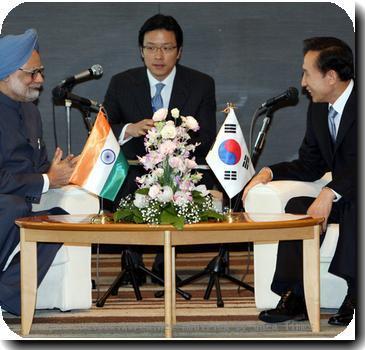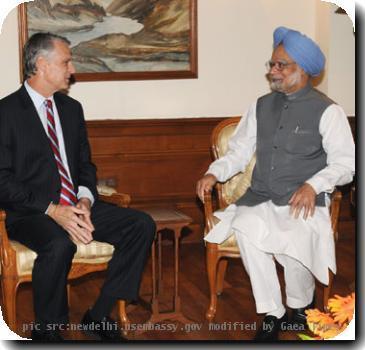India, Pakistan chart way forward in PM level talks (Second Lead)
By IANSThursday, April 29, 2010
THIMPHU - Signalling a step forward in their post 26/11 ties, India and Pakistan Thursday asked their foreign ministers and foreign secretaries to meet to work out the modalities of restoring trust that could pave the way for “substantive dialogue” between the two countries.
In their first formal meeting in nine months, Indian Prime Minister Manmohan Singh and his Pakistani counterpart Yousuf Raza Gilani held 50-minute talks at Bhutan House here in the SAARC Village, on the margins of the eight-nation South Asian Association for Regional Cooperation (SAARC) summit.
“They agreed that the foreign ministers and foreign secretaries will be charged with working out the modalities of restoring trust, paving the way for substantive dialogue covering all issues between them,” Indian Foreign Secretary Nirupama Rao told reporters after the talks.
“The prime ministers held very good talks in a free and frank manner. They agreed that cooperation between the two countries is vital for the people of South Asia to realise their destiny,” Rao said.
“The prime minister expressed India’s concern over the slow progress of Mumbai trial in Pakistan to Prime Minister Gilani.”
Manmohan Singh told Gilani that India was willing to discuss all issues of mutual concern through dialogue but the issue of terrorism was holding back progress, she stressed.
The focus is on charting the way forward, she said.
The two leaders last met at the Egyptian resort town of Sharm el-Sheikh in July 2009. The meeting led to a contentious joint declaration delinking the composite dialogue process from Pakistan’s actions against terror.
India suspended its composite dialogue with Pakistan after the Nov 26, 2008 terror attack in Mumbai in which several Pakistani nationals were involved.
Manmohan Singh raised India’s concerns over cross-border terror and the sharp spike in infiltration, with Pakistan promising that its territory would not be used for terror directed against India, the Indian foreign secretary said.
“The prime minister was emphatic that the terror machine that operates from Pakistan needs to be dismantled,” she said, while adding that India’s concerns over terrorism figured prominently in the talks.
Gilani conveyed that Pakistan was serious about prosecuting the perpetrators of the Mumbai attacks and all efforts should be made to bring the trial of the Mumbai accused to a speedy conclusion, Rao said.
“They have asked us to work out the modalities. All issues of mutual concern are on the table,” Pakistan Foreign Minister Shah Mehmood Qureshi said in a separate press briefing.
Manmohan Singh also conveyed his “deep concern” about the continuing anti-India activities of Lashkar-e-Taiba chief Hafiz Saeed, the suspected mastermind of the 26/11 Mumbai terror attack. Pakistan, in turn, referred to “legal difficulties” in prosecuting him.
“PM (Manmohan Singh) mentioned deep concern about Hafiz Saeed and the way he is allowed to roam free and engage in communication not conducive (to the relationship between India and Pakistan),” Rao said.
The Pakistani premier on his part “did mention that they have difficulties in their legal system” to prosecute Saeed, who had openly declared jehad against India at a Feb 5 rally.
“Pakistan has said it won’t allow terrorists to use its soil,” Rao said.
Both sides stressed that the talks were held in a very warm and cordial atmosphere. The outcome of the meeting has changed the climate between India and Pakistan, an upbeat Qureshi said.
“It’s good news for the region. Let’s be happy with that,” he asserted.
However, trust deficit still exists between the two neighbours, he said, adding that the foreign ministers of the two countries would help to bring the relationship to normalcy.

